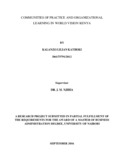| dc.description.abstract | Organizational Learning significantly relies on application of knowledge for a purpose. In organizations, Learning can be viewed from a community based approach where organizations create knowledge in their own systems called Communities of Practice. The study objective was to investigate the impact of using Communities of Practice for Organizational Learning in World Vision Kenya. The study was framed using the Social Network Theory which focuses on how individuals and groups interact with each other inside their network and the Social Exchange Theory, a model that is used for interpreting interactions between individuals and groups that are entirely based on rewards and punishments. To collect the required data, a case study was done using in-depth interviews. The unit of study was World Vision Kenya, a humanitarian organization based in Kenya. A one-on-one interview was conducted with relevant employees in the organization whose engagement in the Communities of Practice is critical. Data analysis was carried out by application of content analysis whereby emerging themes were derived from the responses given during the interviews. The research established that Communities of Practice are critical in Organizational Learning in World Vision Kenya as they effectively promote knowledge sharing between members and help to effectively steer the organization’s strategy in capturing, analysis, dissemination and application of learning and good practice. The Communities of Practice also provide a solid e-learning platform and opportunities for employees and key stakeholders who may have the same interests or work related problems. The issues of geographic separation, lack of skilled Community of Practice leaders, lack of capacity to use Community of Practice technology, competing work priorities and cultural issues were identified as some of the most pressing and emerging challenges. The study findings highlighted various recommendations that will help strengthen the use of Communities of Practice on Organizational Learning in World Vision Kenya. The recommendations include implementing the best practices in application of Communities of Practice in World Vision Kenya across all the Communities of Practice in the organization, employment of skilled Communities of Practice Coordinators who have the knowledge required to effectively manage a Community of Practice and finally, the organization’s management team should play a leading role in championing the use of Communities of Practice by making their use compulsory and allocating sufficient time within normal working hours for staff to collaborate, share knowledge and participate in Community of Practice activities | en_US |



